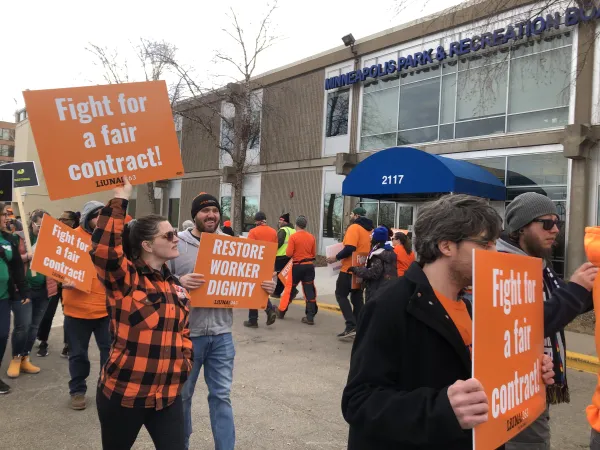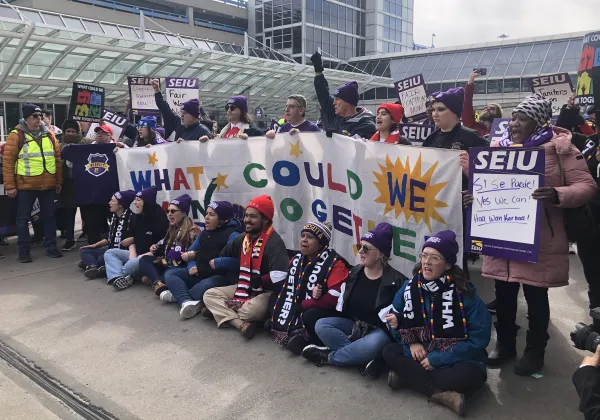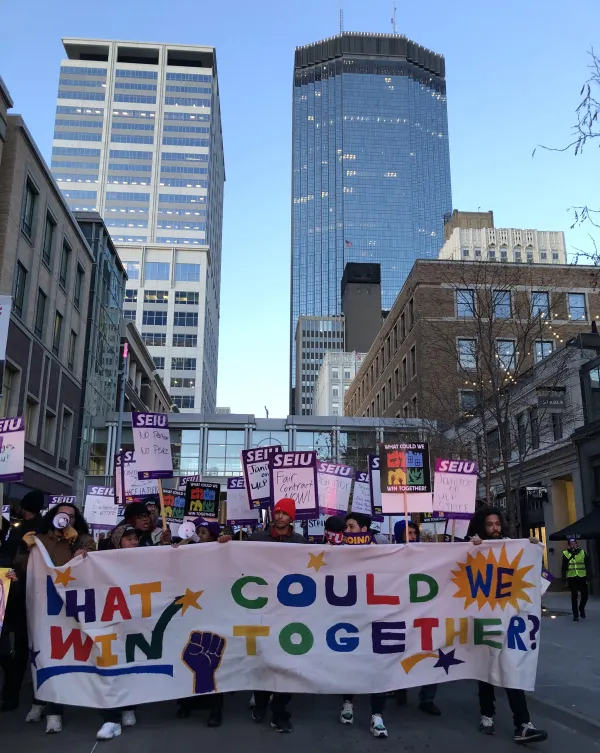What Could We Win Together? Twin Cities unions join for strikes, rallies, marches — and wins
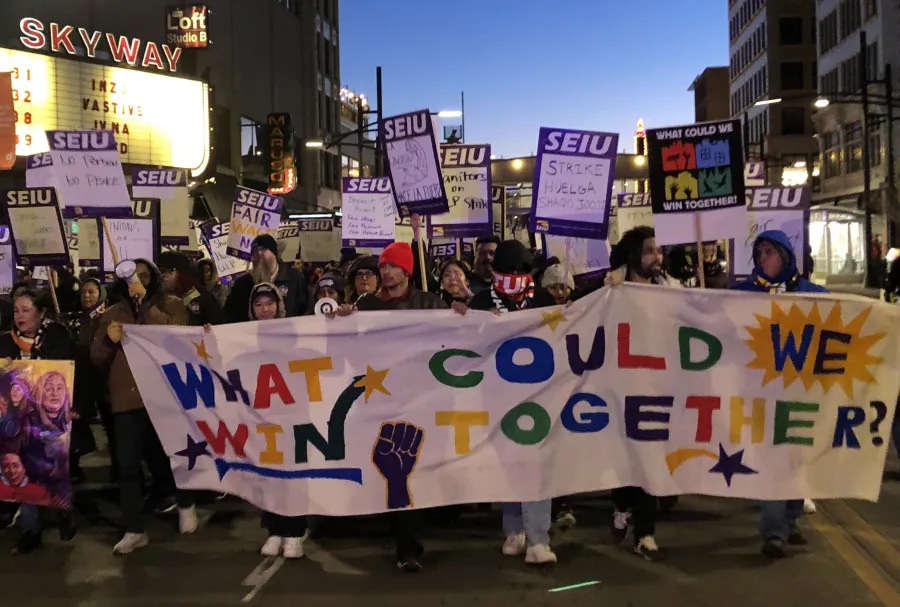
By Steve Share, Minneapolis Labor Review editor
MINNEAPOLIS — In the weeks and days counting down to the first week of March, unions from different job sectors representing 15,000 Twin Cities area workers had authorized strike votes: teachers, transit workers, janitors, nursing home workers, public works employees, and retail staff. March 1 through March 8 saw rallies, picketing, marches, testimony at public hearings — and even civil disobedience. Some of the unions settled their contracts before members needed to go on strike. Other union members walked strike lines for one or more days before their unions won new agreements from employers. Still other contract campaigns continued.
The coordinated action, planned a year in advance, brought the different unions and allied community organizations together in a campaign asking, “What Could We Win Together?”
March 1 through March 8 brought an answer: More than any one union could ever win acting on its own.
The coordinated union actions won national media coverage as well as local news coverage.
“Minneapolis is the center of worker power today,” declared Joseph Bryant, an SEIU international executive vice president who came to witness the week of action. “This is unique in the moment in what’s happening here… seeing the intentionality, the coordination, the solidarity — not one union, but many unions — all coordinating to use collective power to support each other… Hopefully, others will follow suit.”
Here’s a very brief review of the actions and voices seen and heard during the week.
Saturday, March 2
The “What Could We Win Together?” week of action kicked-off with a rally at the North Central States Regional Council of Carpenters union hall in St. Paul.
On the other side of the metro area in Maple Grove, workers at the REI Co-op outdoor goods retailer walked picket lines for the second day of an Unfair Labor Practices strike. The workers, members of UFCW Local 663, still are seeking a first contract nearly one year after organizing. “Ultimately what we want is a fair say in the policies that govern our working conditions,” said worker Blake Buzzo.
Monday, March 4
About 4,000 SEIU Local 26 janitors began a three-day unfair labor practices strike at more than 100 buildings with picketing, a rally, and a twilight march through downtown Minneapolis.
That morning, workers from across job sectors spoke out in favor of a proposed Labor Standards Board at a Minneapolis City Council public hearing. “So many problems would be avoided if workers had a say,” said Chris Pederson, a member of SEIU Local 26 who works for FirstService Residential, a property management company which has opposed union organizing efforts. “We know if we had a voice we could be part of making jobs better.”
Tuesday, March 5
In the largest nursing home strike in Minnesota history, 1,000 workers at 12 metro area nursing homes went on a one-day Unfair Labor Practice strike. The workers are members of SEIU Healthcare Minnesota & Iowa and also UFCW Local 663. At The Estates nursing home in St. Louis Park, strikers chanted, “We work! We sweat! Put $25 on our check!”
During the afternoon, workers from all 12 strike locations came together for a rally outside the Minnesota State Capitol. “We are so overworked and understaffed,” said nursing home worker Nessa Higgins, who is a member of both SEIU and UFCW. She added, “I’ve worked in this field 25 years and I don’t have a retirement plan.”
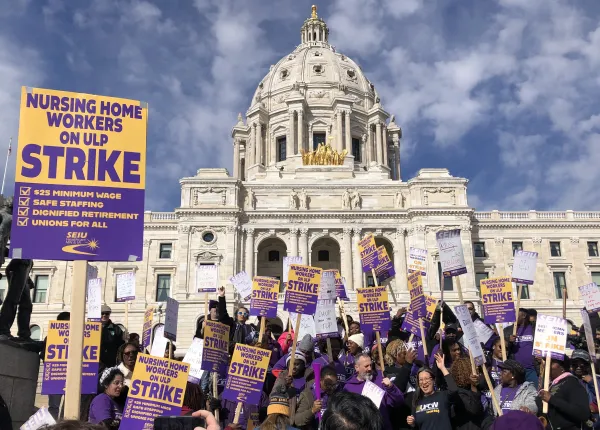
Wednesday, March 6
Ramping up the action, union members and supporters gathered at the Lindbergh Terminal at MSP airport in support of SEIU Local 26 airport workers. They marched in the traffic lanes for vehicles dropping off departing travelers, with airport police shutting down the roadway. Later, 15 activists refused to leave the traffic lanes in an act of civil disobedience and were arrested.
Later that evening, an informational picket line went up outside the headquarters of the Minneapolis Park and Recreation Board in Minneapolis. Park Board workers — who are members of LIUNA Local 363 — are fighting for a fair contract. “They want to push us to take pages of concessions,” said Mitchell Clendenen, Local 363 member. “Everyone’s disgruntled. It’s just working to barely survive… We’re done taking it.”
Across town that same night, union workers joined with community members to announce support for a block-by-block clean energy transition plan including workforce training for skilled union jobs. “We have the opportunity to impact an entire generation of workers,” said Chelsie Glaubitz Gabiou, president of the Minneapolis Regional Labor Federation, AFL-CIO.
Thursday, March 7
CTUL members who work in non-union construction jobs, together with supporters, marched on the offices of Solhem Companies in northeast Minneapolis calling on the employer to adopt a set of standards to guarantee dignity and respect for the workers who build their projects.
On the city’s south side, grassroots housing advocacy group United Renters for Justice/Inquilinxs Unidxs por Justicia convened a forum to discuss creating stable and affordable housing to be built by construction workers who have a voice on the job.
Friday, March 8
The last action of the week focused on quality schools. Participants gathered at the Education Minnesota offices for a short march to a rally on the State Capitol steps.
Speakers represented Education Minnesota, Minneapolis Federation of Teachers, St. Paul Federation of Educators, SEIU Local 284 and TakeAction Minnesota. They urged the legislature to fund school needs and pass the Education Support Professionals Bill of Rights and called for school districts across the state to reach fair settlements for the record-high number of not-yet-resolved contracts with teachers, ESPs and other school staff.
“It feels like we’re all in the same situation,” said Catina Taylor, president of the Minneapolis Federation of Teachers ESP chapter. “When we say we want schools where everyone can thrive, we mean students and educators.”
“We’re fighting and we might be striking all over this state,” said Sara Olson, 8th grade science teacher for the St. Francis school district, whose union was three days away from taking a strike vote.
Assessing what was gained
The unions and community groups who came together behind the “What Could We Win Together?” banner for the March 2-8 week of action were aligned on four main issues: “dignified work, stable housing, a livable planet and good schools.”
Measuring the week’s impact will continue for some time, but in the weeks before, during and after the week of action, here were some of the near-term gains:
• Members of Amalgamated Transit Union Local 1005, who had authorized a strike, ratified a new Metro Transit contract February 18-19 bringing wage increases;
• SEIU Local 26’s 2,000 security officers reached a tentative agreement with contractors February 28 — just five days before planning a ULP strike for March 4 — and winning employer-funded retirement for the first time along with wage increases;
• City of Minneapolis public works department workers, members of LIUNA Local 363 — who also had authorized a strike — voted March 4 to ratify a new contract offering historic wage gains of 30 percent over three years;
• The St. Paul Federation of Educators settled a new contract March 5 — two days after picketing at school district headquarters — winning improved pay and benefits;
• By the end of the week of action which began with their three-day ULP strike, SEIU Local 26’s commercial janitors had reached a tentative agreement on a new contract. They won a raise to $20 per hour, plus an additional 17 percent pay increase over four years, additional paid time off, and, for the first time, an employer-funded 401(k), plus other benefits.
• By the end of March and into early April, SEIU Healthcare Minnesota & Iowa reported contract settlements at several of the nursing homes where workers went on strike March 5, with workers winning pay raises as high as 17 percent, retention bonuses, plus other wins.
What’s next?
“We’re going to show those in power that we’re not going to stop until we get what we need,” said Jamie Gulley, president of SEIU Healthcare Minnesota & Iowa. “The bosses are scared of the power we have when we come together.”
“We all deserve better wages and respect for us and our families,” said Eva Lopez, SEIU Local 26 janitor and union vice president.
“This is just the beginning,” said Kelly Gibbons, president of SEIU Local 284.
